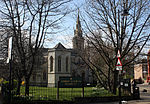Highbury

Highbury is a district in North London and part of the London Borough of Islington in Greater London and in the historic county of Middlesex that was owned by Ranulf brother of Ilger and included all the areas north and east of Canonbury and Holloway Roads. The manor house was situated by what is now the east side of Hornsey Road near the junction with Seven Sisters Road. After the manor decayed, a new manor house was built in 1271 (see below) to the south-east; to differentiate it from the original manor and because it was on a hill, it was called Highbury, from which the area takes its name. The site for Highbury Manor was possibly used by a Roman garrison as a summer camp. During the construction of a new Highbury House in 1781, tiles were found that could have been Roman or Norman; however, these have been lost.
Excerpt from the Wikipedia article Highbury (License: CC BY-SA 3.0, Authors, Images).Highbury
Highbury Grove, London Highbury (London Borough of Islington)
Geographical coordinates (GPS) Address Nearby Places Show on map
Geographical coordinates (GPS)
| Latitude | Longitude |
|---|---|
| N 51.552 ° | E -0.097 ° |
Address
Fieldview Court
Highbury Grove
N5 2AL London, Highbury (London Borough of Islington)
England, United Kingdom
Open on Google Maps






